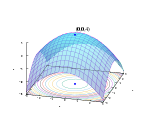Sequential linear-quadratic programming
Sequential linear-quadratic programming (SLQP) is an iterative method for nonlinear optimization problems where objective function and constraints are twice continuously differentiable.
Similarly to sequential quadratic programming (SQP), SLQP proceeds by solving a sequence of optimization subproblems.
The difference between the two approaches is that: This decomposition makes SLQP suitable to large-scale optimization problems, for which efficient LP and EQP solvers are available, these problems being easier to scale than full-fledged quadratic programs.
It may be considered related to, but distinct from, quasi-Newton methods.
In the LP phase of SLQP, the following linear program is solved: Let
denote the active set at the optimum
of this problem, that is to say, the set of constraints that are equal to zero at
In the EQP phase of SLQP, the search direction
of the step is obtained by solving the following equality-constrained quadratic program: Note that the term
in the objective functions above may be left out for the minimization problems, since it is constant.
